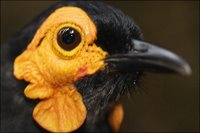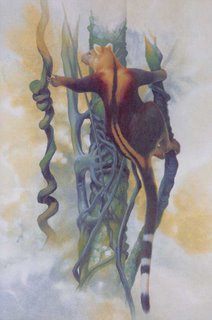 Its always exciting when such a monumental discovery is made. Not just a new species, but an entire forest of new species, discovered by an international science team in the Indonesian jungles.
Its always exciting when such a monumental discovery is made. Not just a new species, but an entire forest of new species, discovered by an international science team in the Indonesian jungles. The team recorded new butterflies, frogs, and a series of remarkable plants that included five new palms and a giant rhododendron flower. The survey also found a honeyeater bird that was previously unknown to science.
There's no evidence of human impact or presence in the forest (although of course thats going to change now that the discovery has been made). The research group - from the US, Indonesia and Australia - trekked through an area in the mist-shrouded Foja Mountains, located just north of the vast Mamberamo Basin of north-western (Indonesian) New Guinea.
Apparently even the Kwerba and Papasena people, customary landowners of the forest who accompanied the scientists, were astonished at the area's isolation.
 Birds were among the highlights of the discovery - among them a type of smoky honeyeater and the rediscovery of the Berlepsch's six-wired bird of paradise. But for me, being a bit of a mammal person, the highlight was another rediscovery, of a Golden Mantled Tree Kangaroo, Dendrolagus pulcherrimus, which was previously thought to have been hunted to near-extinction.
Birds were among the highlights of the discovery - among them a type of smoky honeyeater and the rediscovery of the Berlepsch's six-wired bird of paradise. But for me, being a bit of a mammal person, the highlight was another rediscovery, of a Golden Mantled Tree Kangaroo, Dendrolagus pulcherrimus, which was previously thought to have been hunted to near-extinction. I remember reading about this animal years ago, and the description of it in a New Guinean tribal story:
I remember reading about this animal years ago, and the description of it in a New Guinean tribal story:"There was once a tree-kangaroo at Sweipini that had a face just like you white men. We called it Weimanke. My father caught one when I was a little boy, but it is long gone now. The earthquake [of 1934] killed them all ...
- Kaspar Seiko of Wilbeitei Village,
Torricelli Mountains, Papua New Guinea, 1990.
Well now the species has been positively identified again in this newly discovered region, so hopefully further research can establish and demarcate a new breeding population, setting it aside as a conservation area.

Dendrolagus pulcherrimus in real life

No comments:
Post a Comment